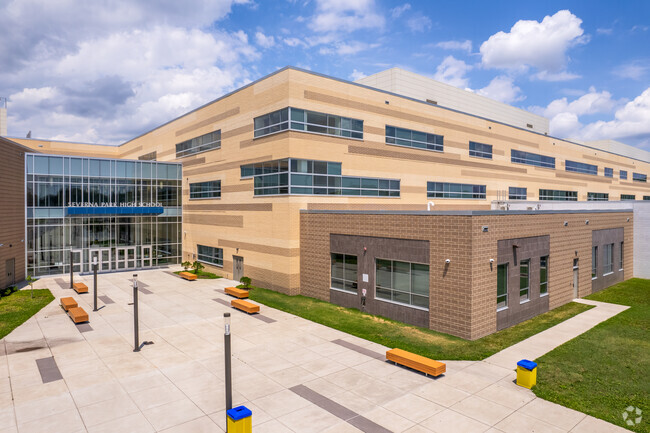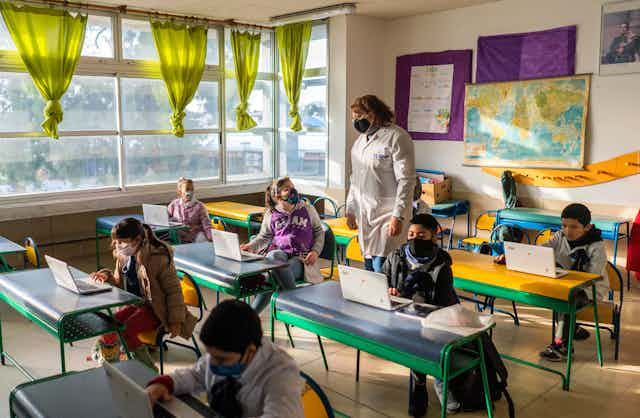Innovative Solutions to Save Temecula Schools from Budget Cuts
Innovative Solutions to Save Temecula Schools from Budget Cuts
Blog Article
Exactly How Schools Play an Essential Role in Shaping Future Leaders and Innovators
By incorporating project-based understanding and interdisciplinary researches, instructional establishments test trainees to examine and synthesize complex information. Educators serve as advisors, leading students and supporting their capacity, while extracurricular activities even more create management skills and resilience.
Promoting Critical Assuming
In today's quickly evolving world, fostering important assuming within schools has become critical. As culture faces significantly intricate international obstacles, the ability to analyze, review, and synthesize details is crucial. Schools play a crucial duty in creating these abilities, preparing students to navigate and resolve complex issues with notified, reasoned choices.
To cultivate essential thinking, educators use numerous pedagogical strategies that urge energetic knowing and intellectual interaction. Classroom conversations, problem-based learning, and Socratic examining contribute in advertising reflective and logical mind. By challenging trainees to interrogate assumptions and think about several viewpoints, these methods ensure a deeper understanding of subject matter beyond memorizing memorization.
Moreover, incorporating essential believing across the educational program reinforces its significance and applicability in diverse contexts. Topics such as mathematics, scientific research, history, and literary works each offer unique opportunities to establish pupils' critical faculties. As an example, assessing historical events needs recognizing and examining resources context, while clinical query demands rigorous hypothesis testing and evidence-based reasoning.
Ultimately, instilling crucial assuming abilities in students furnishes them with the cognitive tools essential for lifelong understanding and versatility. It is via this fundamental proficiency that future leaders will certainly be able to innovate, fix problems, and add meaningfully to culture.
Urging Imagination
Welcoming creativity within academic frameworks galvanizes trainees to assume beyond standard boundaries and check out cutting-edge remedies. By integrating artistic ventures and creativity exercises right into the educational program, schools grow an environment where creativity and imaginative idea are valued. This approach not only enhances the educational experience however additionally outfits pupils with the ability to deal with real-world challenges in unique means.
Educational establishments can promote creativity with varied ways such as project-based understanding, interdisciplinary researches, and the unification of arts and modern technology. Project-based learning, for circumstances, urges pupils to apply their knowledge in practical, typically collaborative, tasks that demand inventive analytical abilities. Interdisciplinary researches enable trainees to draw links in between different topics, thus widening their perspectives and boosting their innovative capacities.
In addition, providing students with chances to engage with arising modern technologies, such as coding and digital design, further supports their creative potential. These activities trigger trainees to experiment, fail, and repeat, which are vital elements of the imaginative process (Save Temecula Schools). By keeping an encouraging atmosphere where testing is motivated, colleges can guarantee that trainees create the confidence to pursue innovative ideas
In essence, nurturing imagination in educational settings is crucial for forming future leaders and innovators with the ability of resolving complex international concerns with resourcefulness.
Encouraging Partnership

Implementing group-based knowing components and cooperative jobs enables pupils to experience the characteristics of synergy firsthand. This not only prepares them for the collective nature of contemporary offices however likewise nurtures management high qualities as they commonly have to tackle duties such as project supervisors or group planners. Furthermore, collaboration in the classroom can damage down social obstacles and Source advertise inclusivity, making sure that each trainee feels valued and listened to.
Moreover, incorporating modern technology can further support collaborative initiatives. Devices like common interactive systems and electronic offices enable pupils to collaborate effectively, even outside the class. As students create these joint skills, they are better outfitted to deal with intricate difficulties and introduce, preparing for their future duties as pioneers and leaders.
Role of Educators as Coaches

Mentorship includes customized interest, where educators determine and support private toughness and address weak points. Save Temecula Schools. Through one-on-one communications, educators can customize their guidance and assistance to satisfy each trainee's one-of-a-kind needs, fostering a sense of confidence and durability. This personalized approach cultivates a growth way of thinking, urging students to view failings as chances for finding out and development
In addition, educators function as good example, demonstrating the worths of compassion, honesty, and willpower. Their mindsets and activities provide a plan for pupils to emulate, instilling a feeling of honest obligation and social awareness. By producing a inclusive and encouraging class atmosphere, teachers allow students to develop social skills that are vital for efficient leadership.
In significance, the mentorship given by instructors lays a fundamental structure for the advancement of future leaders, furnishing them with the knowledge, skills, and values required to stand out in an ever-evolving globe.
Effect of After-school Activities
When integrated effectively right into the instructional framework, extracurricular activities significantly improve student growth and leadership capacity. These activities give students with chances to discover passions beyond the traditional educational program, promoting a well-rounded skill collection.
Moreover, extracurricular involvement urges imagination and advancement. Students engaged in discussion, music, or dramatization clubs learn to assume critically and method problems from varied viewpoints. These experiences impart confidence, enabling pupils to voice their ideas and take initiative in numerous settings. By collaborating with peers from various histories, students additionally establish empathy and interaction abilities, essential traits for future leaders.
Study shows that trainees entailed in such programs often tend to have greater grades and much better participation records. Thus, schools that focus on a balanced method to education, integrating durable extracurricular programs, are extra most likely to create leaders and trendsetters equipped to fulfill the obstacles of the future.

Final Thought
Finally, institutions considerably form future leaders and trendsetters by supporting vital reasoning, imagination, and collaboration amongst trainees. Involving pedagogical strategies such as project-based knowing and interdisciplinary studies play a vital duty in this use this link growth. Educators, serving as coaches, provide necessary assistance and support, while after-school activities further boost management potential and resilience. By fostering a supportive atmosphere that values specific staminas and team effort, institutions outfit trainees with the required skills to navigate future obstacles and drive advancement.
As trainees create these joint abilities, they are much better furnished to deal with complicated challenges and innovate, laying the groundwork for their future roles as leaders and pioneers.
By promoting crucial thinking and analytic skills, educators assist pupils browse complicated challenges, preparing them for leadership functions in different fields.
By collaborating with peers from different backgrounds, pupils also establish empathy and communication abilities, vital attributes for future leaders.
In verdict, colleges dramatically shape future leaders and pioneers by supporting crucial thinking, imagination, and you can try this out collaboration among pupils. By cultivating an encouraging environment that values specific strengths and team effort, schools outfit pupils with the essential skills to browse future obstacles and drive development.
Report this page